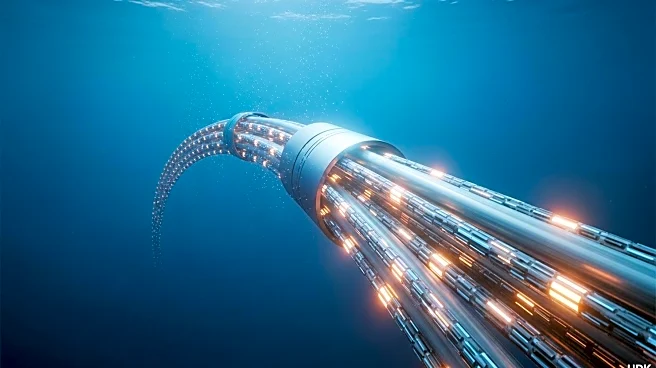What's Happening?
Keppel, one of the owners of the Bifrost Cable System, has announced that the subsea cable linking the United States to Southeast Asia is now ready for service. The Bifrost system, spanning over 20,000 km, has been under construction by Alcatel Submarine Networks since 2021. It is backed by Keppel Midgard Holdings, Meta, Amazon, and Telin. The cable connects California and Oregon in the US with Singapore, featuring intermediate landing points in Guam, Jakarta, Manado in Indonesia, and Davao in the Philippines. The system boasts a round-trip latency of just under 165 milliseconds between Singapore and the US, which is up to 10 milliseconds faster than many existing systems. Additionally, Bifrost introduces more than 260 Tbps of capacity along the trans-Pacific corridor, engineered to support AI workloads, cloud-native platforms, and real-time digital services.
Why It's Important?
The Bifrost Cable System is a significant development in digital connectivity between Southeast Asia and the United States. It reinforces Singapore's position as a leading digital hub in Asia and supports the region's rapidly growing digital economy. For the Philippines, the system provides redundancy and diversity in network infrastructure, enhancing the country's digital capabilities. The increased capacity and reduced latency are crucial for supporting modern digital services, including AI and cloud-native platforms, which are vital for businesses and consumers in the region. This development is expected to boost international bandwidth capacity and facilitate the digital journeys of countries in the Asia-Pacific region.
What's Next?
As the Bifrost Cable System becomes operational, it is expected to carry commercial traffic in the coming weeks. Stakeholders such as Keppel, Meta, Amazon, and Telin will likely focus on optimizing the system's performance and expanding its usage across various digital services. The enhanced connectivity may lead to increased collaboration between businesses in the US and Southeast Asia, fostering economic growth and technological advancements. Additionally, countries in the region may explore further investments in digital infrastructure to capitalize on the improved connectivity.
Beyond the Headlines
The Bifrost Cable System's impact extends beyond immediate connectivity improvements. It may influence geopolitical dynamics by strengthening ties between the US and Southeast Asia through enhanced digital infrastructure. The project also highlights the growing importance of subsea cables in global communications, as they become critical assets for supporting the digital economy. Furthermore, the involvement of major tech companies like Meta and Amazon underscores the private sector's role in shaping global connectivity and digital infrastructure.










